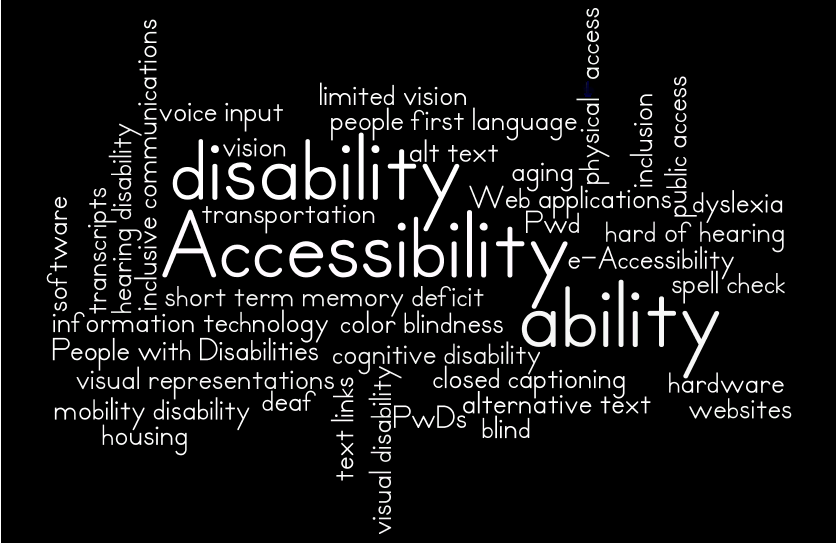Using proper terms while interacting with persons with disabilities is very important. If you do not be sensitive; you may hurt the sentiments of a person with disability. We all need to understand that nobody wants to be disabled. Disability is a matter of chance. It can affect anybody, anywhere. So it is important to treat everybody as equal and not to make someone feel that her disability has made her inferior.
Every word has a specific and precise meaning. Injudicious use of words may inadvertently convey a wrong meaning to others. That is why it is important to learn proper terminology for various purpose. Disability etiquette recommend the use of certain terms in relation with disability conditions and persons with disabilities. Similarly, use of certain terms is discouraged despite the fact that they are commonly used.
To emphasize on why proper terminology is important, we have published articles against the use of the term Divyang in India. This term is being used by the government to refer to persons with disabilities. In Hindi, divyang means a person with divine body part(s)!

In our previous article, we had discussed some basic disability etiquette. In today’s article we are giving a table of disability terminology dos and don’ts.
Disability Etiquette: Proper Terms
| # | Do Use | Don’t Use |
|---|---|---|
| 1 | Person with disability | Disabled, Handicapped, Invalid, Deformed, Crippled, Defective, Victim |
| 2 | Wheelchair user | Wheelchair bound, confined to wheelchair |
| 3 | Congenital disability | Birth defect |
| 4 | He has Cerebral Palsy | He is a victim of Cerebral Palsy |
| 5 | Acid attack survivor | Acid attack victim |
| 6 | Person with Down Syndrome | Down’s person / Mongoloid |
| 7 | Person speech disability | Dumb, tongued-tied |
| 8 | Deaf and mute | Deaf and dumb |
| 9 | Person with a mental illness, person with an emotional disorder | Mentally ill, mentally unstable, crazy, psycho, mental case, retarded |
| 10 | Has a brain injury | Brain damaged |
| 11 | Amputee | Gimp, lame, limp |
| 12 | Has chemical / environmental sensitivities | Chemophobic |
| 13 | Accessible parking | Disabled parking |
| 14 | Accessible restroom | Handicapped restroom |
| 15 | Person who is blind, visually impaired | Visually handicapped |
| 16 | Burn survivor | Burn victim |
| 17 | Polio survivor | Polio victim |
| 18 | Child with learning disability | Slow learner |
| 19 | Person with developmental disability | Slow |
| 20 | Person with intellectual disability | Retarded |
| 21 | Person with autism | Autistic, Savant |
| 22 | Person with spinal cord injury | Cripple |
| 23 | Person of short stature | Dwarf, midget |
| 24 | Disability | Handicap |
| 25 | Epilepsy | Fits, seizures |
| 26 | Person with AIDS | AIDS victim |
That’s the list! As usual, we will keep on updating this list with time.
It must be noted that different places in the world may have different conventions regarding how to appropriately refer to persons with disabilities. As we mentioned in the beginning, Indian government is using divyang word to refer to a person with disability. Similarly, in some places Visually Impaired could be an acceptable term whereas in other places people may feel offended by it. Hard of Hearing is another term that might evoke different reactions.
Nevertheless, it is widely acknowledged that disability is a better term than handicap and person with disability should be used instead of disabled person.
Instead of victim it is always better to say survivor.
Terms like retarded, crippled and handicapped are most certainly out-dated. Nowadays, terms like physically challenged and differently-abled are also going out of usage.
We request you to help us with the appropriate disability related terminology in your part of the world. We wish to sensitize the whole world and your help can be of great impact. We hope you liked this article.
Please use the comments section below to send your questions, comments and suggestions. Thank you for using WeCapable.
Use the citation below to add this article to your bibliography
"Disability Etiquette: Appropriate Language and Terminology." Wecapable.com. Web. June 15, 2025. <https://wecapable.com/disability-etiquette-proper-terms/>
Wecapable.com, "Disability Etiquette: Appropriate Language and Terminology." Accessed June 15, 2025. https://wecapable.com/disability-etiquette-proper-terms/
"Disability Etiquette: Appropriate Language and Terminology." (n.d.). Wecapable.com. Retrieved June 15, 2025 from https://wecapable.com/disability-etiquette-proper-terms/

Deaf and dumb???? excuse me!! I am Deaf but NOT dumb! I can speak very clearly yet have Deaf friends who chose not to speak.
Why not just Deaf without the other baggage?